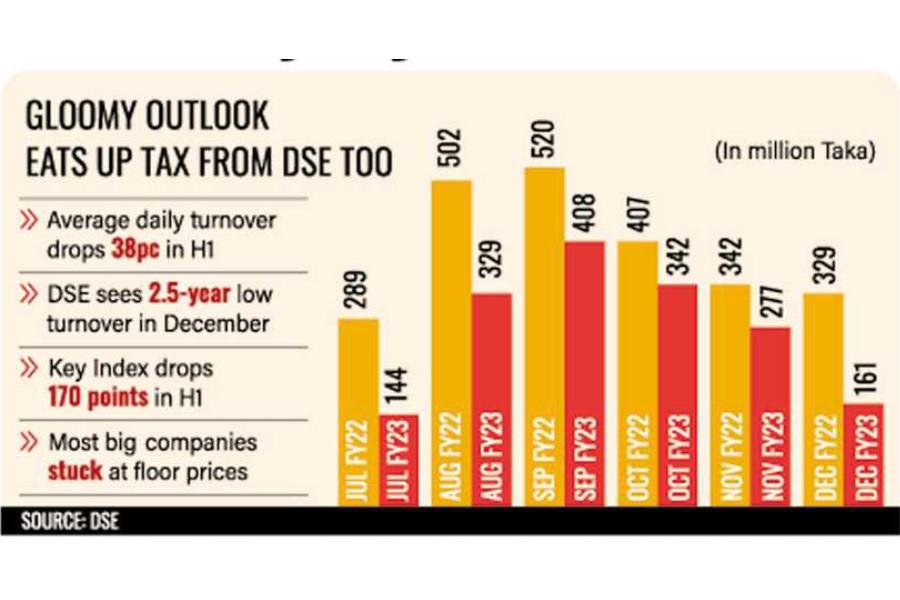The government's tax revenue from the Dhaka Stock Exchange (DSE) dropped 30 per cent year-on-year to Tk 1,661 million in the first half of the current fiscal year, owing to a plunge in turnover.
The market was sluggish throughout the period. Low share sales by sponsor-directors made things only worse, dragging down daily turnover and stripping away government's earnings from the prime bourse, said Mostaque Ahmed Sadeque, former president of the DSE Brokers Association of Bangladesh.
The presence of floor price and investors' lack of confidence played a major role behind the low turnover in recent months, said Mr Sadeque, also managing director of Investment Promotion Services, a brokerage firm.
The average daily turnover was less than Tk 3.50 billion over the past couple of months with the lowest in 2.5 years recorded in a few sessions in December.
Mr Sadeque said low turnover caused a massive dent in the income of the brokerage houses as they earn in the form of commission on share transactions.
As transactions dried up, brokerage houses are struggling to meet their operating expenses, he added.
The government earned the revenue from TREC (trading right entitlement certificate) holders at 0.05 per cent in commission and from sponsor-directors and placement holders at 5 per cent on share sales.
The stock market was bearish throughout the first half of this fiscal year as global and local economic concerns intensified with forecasts of recession in several parts of the world this year.
The main index plunged below the psychological threshold of 6,000-mark, forcing the securities regulator to reinstate the floor price by the end of July 2022.
The imposition of the price movement restriction curbed liquidity in the market. That in part contributed to a 38 per cent dip in the daily average turnover to Tk 8.25 billion in the six months through December.
Investors were not confident enough to inject fresh funds into stocks amid a dismal market outlook, which also led to lower turnover, said Enam Ahmed Hasan, portfolio manager at Bangladesh Finance Capital.
Big buyers and institutional investors were upset as they could not buy shares in large volumes at lucrative prices due to the price restriction, he said.
The market movement relied mostly on a handful of stocks as most other securities were stuck at floor prices without potential buyers since those were deemed overvalued even at that level.
The latest regulatory move lifting the price restriction for 169 stocks last month even failed to attract investors. In fact, the single-day turnover slumped to 30-month low after the policy change.
The 1 percent lower circuit breaker put in place instead for the selective stocks did not work, as expected, in letting gradual price corrections to a certain level.
Most large-cap companies, such as British American Tobacco, Grameenphone, Renata and Singer Bangladesh, with excellent reputation, which had dominated the turnover list earlier failed to lure investors in the current gloomy economic scenario.
Of the total tax revenue in July-December 2022, Tk 1,119 million came from TREC holders in commission, popularly known as brokerage commission, while Tk 466 million from share sales by sponsor-directors and placement holders.
The government earned Tk 2.91 billion, the highest in 11 years, in the previous fiscal year, driven by record turnover in few sessions.
However, the FY11 saw the historical highest tax revenue of Tk 4.47 billion paid by the DSE to the government exchequer when the market witnessed a wild trend before crashing.


